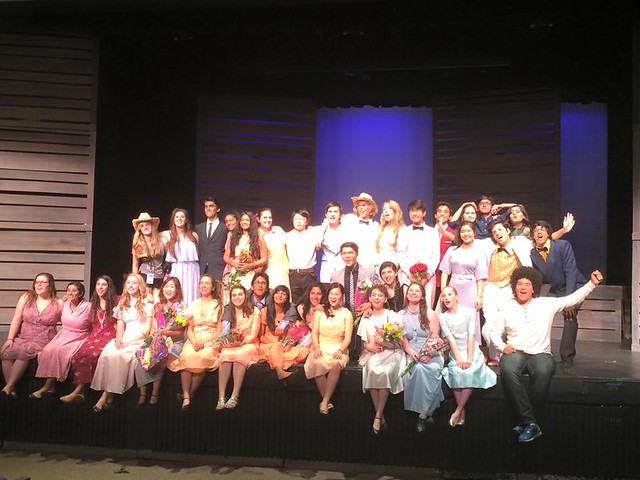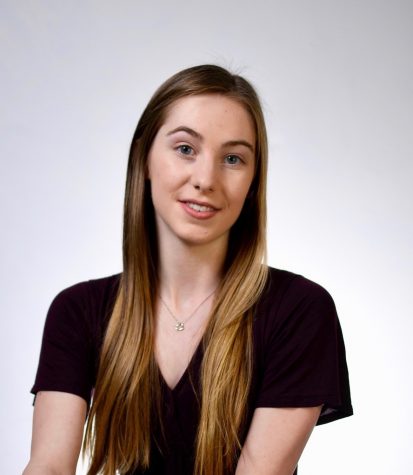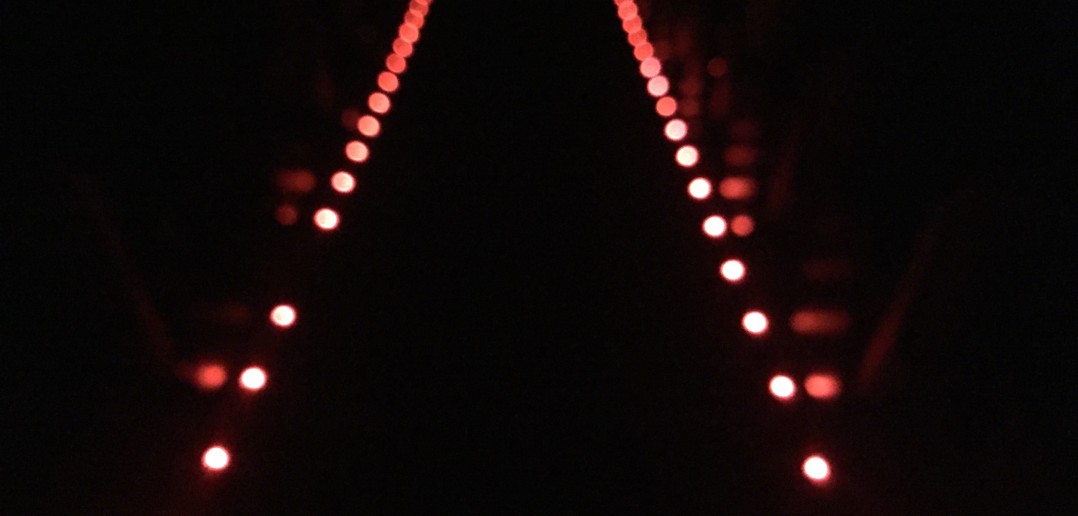 The lights fade to nothingness as I take one last look around. My head snaps forward. I shake out my hands. Breathe in, breathe out. I close my eyes, but open them again as anxiety, excitement and anticipation course through my veins. The music begins. I stop going through every detail in my head, letting my mind trust my muscles. A flicker of panic in the pit of my stomach resurfaces as the curtain pulls back, but then I am onstage and I am myself and I am alive, immersed in the moment. This is the silent ritual that I’ve gone through for every drama performance during my four years at MVHS. Standing in the darkness of the wings of Helene Madson Theater, looking up into the pitch-black curtains that extend past the sky itself, limitless, as I prepare to assume another identity, if only for an hour or two.
The lights fade to nothingness as I take one last look around. My head snaps forward. I shake out my hands. Breathe in, breathe out. I close my eyes, but open them again as anxiety, excitement and anticipation course through my veins. The music begins. I stop going through every detail in my head, letting my mind trust my muscles. A flicker of panic in the pit of my stomach resurfaces as the curtain pulls back, but then I am onstage and I am myself and I am alive, immersed in the moment. This is the silent ritual that I’ve gone through for every drama performance during my four years at MVHS. Standing in the darkness of the wings of Helene Madson Theater, looking up into the pitch-black curtains that extend past the sky itself, limitless, as I prepare to assume another identity, if only for an hour or two.
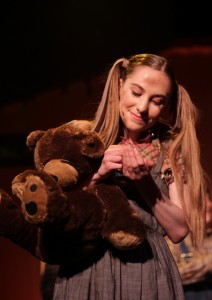
I used to be afraid of the dark. As a young child, I’d sit lying awake in bed, jumping at the slightest creak downstairs. I was always worried that something would suddenly pop out in front of me or that I’d fall, simply because I couldn’t see the ground. Trusting what I couldn’t see didn’t come easy. Drama changed all that.
It changed my life to the point where I don’t see my four years in high school in terms of freshman, sophomore, junior or senior year. My years at MVHS are defined in terms of shows. The year of the first one, “Footloose.” The year of “The Addams Family.” The year we were ambitious and ran a dinner theater murder mystery. The year of the last mainstages. The list goes on and on.
Even my strange backstage ritual has changed over time. During my first production with Monta Vista Theatre Arts, “The Great Gatsby,” I remember feeling so nervous standing in the wings with the lights off. I was stepping onto a stage that had seemed so far out of reach when I watched a mind-blowing, professional-level production of “The Arabian Nights” on that very same black raised platform two years earlier in eighth grade. And here I was: in full costume, trying to make my hair stay in curls, about to walk on stage and perform in one of these shows.
Flash forward exactly three years. It’s closing night of “Urinetown,” my last mainstage production with the people who have become my family, in the place I’ve spent more hours in than my actual house. I know every inch of this theater like the back of my hand. There’s the ripped corner of the cyclorama (that white cloth at the back of the stage), and the fake lettuce that lies hidden in an alcove in the green room just out of reach. There’s the girls locker room that the boys axe-bombed during one of our backstage prank wars. There are the headsets on either side of the stage that feed communication between us in the wings and the tech booth behind the audience with a single whisper.
I’m backstage again, looking up into the curtains, but this time they don’t seem so ominous. They fit comfortably into the universe where creating a world out of shapes and colors and voices and laughter has become second nature for everyone who lies in wait for the lights to come up on the stage.
I’m backstage again, looking up into the curtains, but this time they don’t seem so ominous. They fit comfortably into the universe where creating a world out of shapes and colors and voices and laughter has become second nature for everyone who lies in wait for the lights to come up on the stage. Without even a whisper, we’ve all settled in step with each other to create something beautiful and uniquely ours. I don’t need to see those next to me to know that I don’t need to be afraid. To trust them.
My former drama teacher and mentor Sara Capule once told me that the magic of live theatre is that it’s never the same show twice, always unique. And you drink it all in while it lasts, because when you walk out to take that final bow, it dissipates just as soon as it started. But there’s more to the magic than what happens on the stage. Drama has taught me to never take anything for granted. Working as a producer, a director and a sound designer throughout the years has shown me that the magic is only what we make of it. If we give it everything, if we work tirelessly to pay attention to every little detail, add a second of pause here or a glance there, or a trill of cacophony in between, then it will give back.
Like it did the night before the opening performance of “MVSNL ’18,” a project that had become my everything. We were leaving at around 9:30 p.m., having finished the dress rehearsal, assigned out jobs for the next day, laughed a bit, debriefed the run and essentially exhausted almost every fiber of our being. Mr. Adams, our substitute drama teacher, was locking up the black box, and my co-producer Megumi and I were tasked with locking up the auditorium. But she had to leave a bit earlier. So it was just me in the now-comfortable space that had once seemed so vast and imposing.
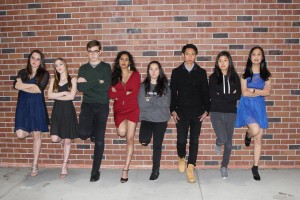
I walked up and down the aisles, habitually checking for trash, making my way to the switches without thinking about where they were. I turned off everything in the sound and light booth, and then finally turned off the house lights. I was about to turn and walk out the door when I caught sight of the small red lights that illuminate the floor of the aisles leading up from the stage to the lobby. And as I stood there, I realized that this space had become the physical embodiment of the stage in my life that has been high school.
That stage was the one where I had rediscovered my love for theatre, my love for singing and my love for dancing. It was where I had found my best friends, where I would share numerous inside jokes and long nights rehearsing, worrying, laughing, working hard and leaving my heart and soul on that black, dusty floor.
That stage is the one where I unofficially decided to commandeer the room in the black box known as the OMG, named for the exclamation that came from Mrs. Capule’s mouth when she walked in there on account of the incredible, wonderful disaster of costumes, craft supplies and tools that was housed inside it. It was where I would make sense of my own life as I slowly organized paints and paper into the OMG’s bins and labeled them nicely with blue duct tape. Where I became “mom,” “drama mama” and “mama bear.”

That stage is where I found a home. It’s where sentences such as “have you seen the gaff?” or “peace, manssssss!” became habitual. Where every time we turned off the lights before a show or a tech run, everyone is enveloped in a warm darkness that only exists when you’re all working towards a common goal, so connected that you don’t even need to see each other to trust that you will be there for one another.
It’s a theatre custom that whenever you turn off all of the lights, you say “going dark” so that the actors and other production crew know that they’re about to be in blackness. We all respond “Thank you, dark,” to acknowledge that we heard it, and that because of the warning, we hopefully won’t trip on everything backstage and fall flat on our faces.
As the lights went down on my final performance, going dark for the last time, I thanked the darkness. I thanked this place for making me more comfortable in it, for giving me the memories that will last a lifetime. For making me confident in myself, in those around me and in the power of the arts to bring human connection and experience and truth to life time and time again. I thanked it for bringing me those moments before the music started and I would step on the stage behind the red curtain and take one last look around as the lights faded to nothingness. Where I could trust that when the lights came up again, theatre would catch me. My family would catch me. We’d support each other.
At the end of the day, I think that’s the magic of theatre. It’s a blind trust in those around you, necessary to portray a new facet of the human experience. To be vulnerable together. To make something beautiful together that is unique and truthful to the point of being able to feel the energy of what you are creating even in the darkness, transcending all sense.
So this is how it works. You’re a wide-eyed freshman and you’re sitting there thinking ‘what the heck, might as well try out for this play.’ And nothing goes the way you planned and you leave water bottles everywhere along the way, but when you come back to rehearsal the next day they’re still there.
This is how it works. You walk into a room full of strangers not sure if you’ll ever know anything about them beyond their names. And the ones you thought were the most annoying become your best friends and you sit there laughing late at night around a dinner table wondering how, by some miracle, everything came together in the end.
This is how it works. You sit there on the stage for the first time before the first show and this feeling fills you up that’s like a thousand tiny fireworks rising inside of you as the lights come on. And then you’re sitting in the dark, the last one there, locking up for the night, and suddenly you feel it even though the lights won’t come on for another 22 hours. That door clicks behind you and you realize that your water bottle is still in there but it’ll be there tomorrow.
So this is how it works. You sit there watching your crazy friends run the Fitnessgram pacer test in the black box for the entirety of lunch and you can’t help but laugh. You conquer your fear of heights because a part of the eight-foot tall set needs wood filler. You hold on tight to every single moment because it’s never the same moment twice. And you’ve squeezed so hard that everything’s slipped through your fingertips because that’s the magic of live theatre. You don’t know you’ve missed it until it’s gone.
And as the lights fade on my MVHS Drama experience, all I can say, other than how much I will miss the amazing family it gave me, is thank you, dark. 